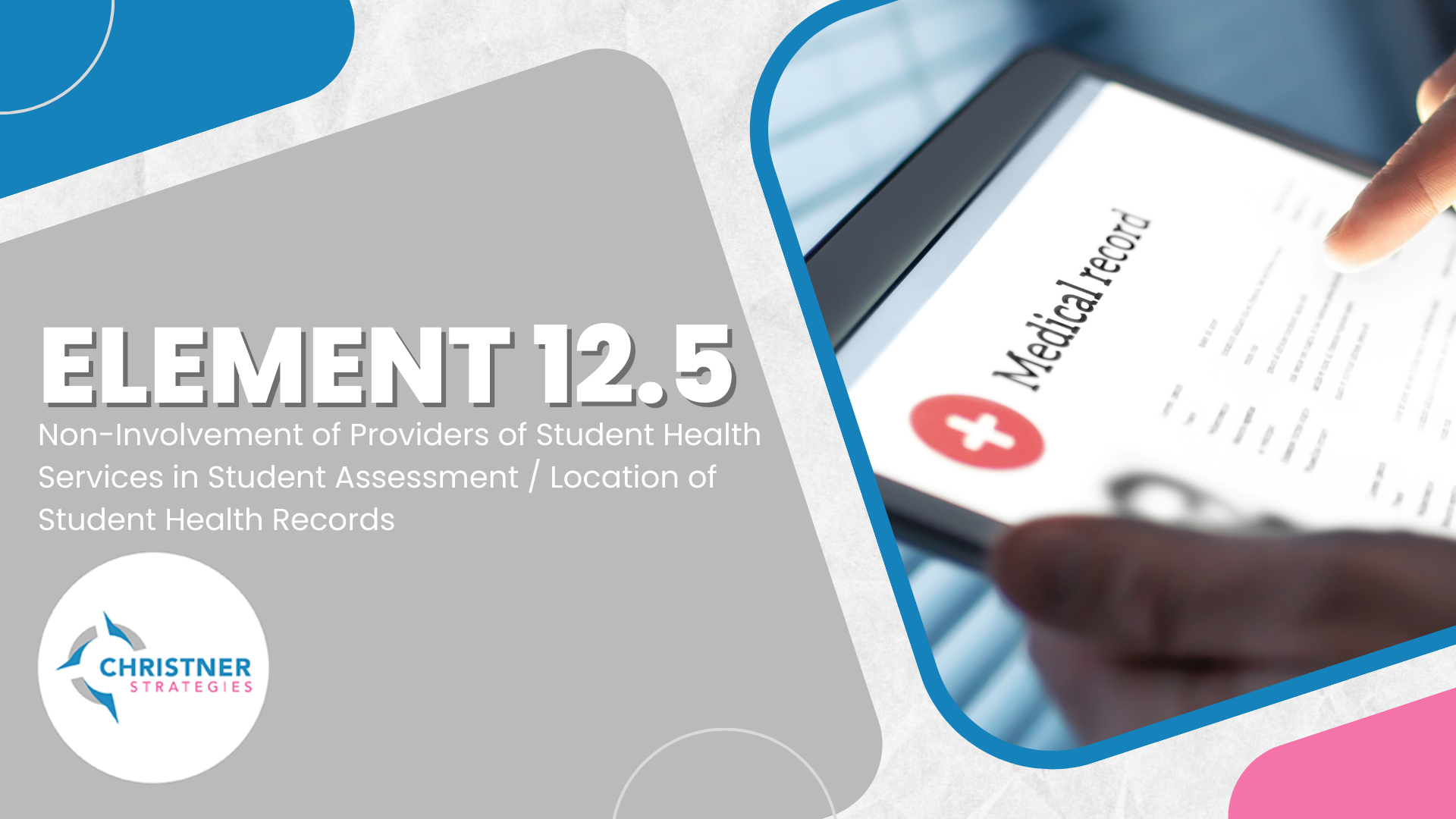Element 12.5 – Non-Involvement of Providers of Student Health Services in Student Assessment/Location of Student Health Records
The health professionals who provide health services, including psychiatric/psychological counseling, to a medical student have no involvement in the academic assessment or promotion of the medical student receiving those services, excluding exceptional circumstances. A medical school ensures that medical student health records are maintained in accordance with legal requirements for security, privacy, confidentiality, and accessibility.
Hidden Curriculum
This element is commonly cited per the LCME. Medical students may at times seek medical, including psychiatric or psychological, treatment from faculty or house staff physicians. Due to the substantial number and diverse range of your schools’ residents and faculty members, as well as the size of the student body, it’s often challenging to be aware of a known physician/patient relationship between the student and the faculty member or resident when creating student schedules. Consequently, students might be assigned to these faculty members or residents.
In situations where a student is assigned to a healthcare environment where a supervising faculty member or resident, who has previously provided health care services to the student, will assess or evaluate the student’s performance, the faculty member or resident is required to inform the course/clerkship director. A recent citation that another school received was centered on exactly this – it is the faculty member’s responsibility to alert the clerkship team, NOT the student’s. Their policy had read “(it is…) the primary responsibility of the student to notify the course or clerkship director and ask to be reassigned,” despite the fact that the conflict of interest is that of the faculty member who has had a prior professional or familial/intimate relationship with the student and who is in the position of being expected to assess that student. Remember – the LCME views most things as the faculty responsibility!! No formal policies and/or procedures in place regarding non-involvement of health services providers in medical student academic assessment and/or promotion decisions can carry significant consequences with the LCME.
Aside from schools having policies and procedures in place that protect students from conflict of interest in academic assessment and promotion/graduation decisions, schools should also ensure they have a process for the confidentiality of medical students’ records.
Best Practice
Your school should have a clear and unambiguous policy that protects students from conflict of interest in academic assessment and promotion/graduation decisions. The policy should make clear that educators who also serve as health providers may not participate in the academic assessment or promotion of any learner to whom the educator currently, or at any time provided or helped to provide healthcare services. The health provider must recuse him/herself from participating in the academic assessment and promotion of that learner. Conflicts of interest may include but are not limited to family/personal relationships or providing medical/psychiatric services to the student. The policy should be applied to all educators, health providers, and learners at your school. The provider does not need to state and SHOULD NOT state what the nature of the conflict is – only that there is one.
Another citation that a school received was around student’s received services from psychiatry residents… “Psychiatry residents, supervised by psychiatry faculty, provide medication evaluation and management. While policies and procedures are in place to reduce the risks of conflicts of interest and breaches of medical student privacy, they do not eliminate this risk.” It is really best if there are separate mental health providers that never oversee/interact with medical students.
The dissemination of a Conflicts of Interest policy to students, residents, and faculty is crucial for ensuring awareness and compliance. It is good to consider a multi-modal approach. Some ideas:
- Including the policy in the student handbook
- Publishing the policy on the school’s public and internal websites,
- Including information about the policy in course overview documents and specifically mentioning it at the beginning of each course orientation.
- Posting the policy on the school’s learning management system (e.g., Blackboard, Canvas) and linking to it from relevant course pages.
- Incorporating information about the policy into an online orientation module for residents, ensuring they are informed about it at the beginning of their residency
- Sending the policy directly to residents via email, ensuring they have a digital copy for reference.
- Including the policy in the Teaching Faculty Handbook, which serves as a guide for faculty members and outlines their responsibilities.
- Having faculty attest to the policy annually as part of the faculty reappointment process to ensure ongoing awareness and compliance.
- Discussing the policy during in-person department meetings, where faculty members can ask questions and seek clarification.
Apart from establishing policies and procedures of Non-Involvement of Providers of Student Health Services in Student Assessment, how does your school ensure that a student is not being instructed and evaluated by a physician who has previously delivered healthcare services within your student health service system? Contemplate integrating an attestation into your school’s evaluation system to officially record whether the evaluator has or does not have a conflict of interest before assessing the student. By submitting the evaluation, faculty and residents are confirming they do not have a conflict with the student. Having students attest to reading the COI policy through their Student Handbook, course overview document and orientation.
How does your school ensure the confidentiality of medical students’ records? It is crucial to emphasize that these records should not be stored in the dean’s office. Instead, they should be received, reviewed, and maintained by an entity possessing specialized knowledge and authorized to act on behalf of the school, program, or institution. Some schools have implemented a Student Records Policy that highlights the storage and retention, release and use, integrity, security, & confidentiality, and student access.
To maintain privacy and security, school deans, along with other academic faculty and staff, are restricted from accessing Student Health Records. Any release of these records beyond their secure storage requires explicit consent from the student. This approach is essential to safeguarding the sensitive information contained in Student Health Records.
Continuous Quality Improvement
This element expects that schools have a formal policy for Non-Involvement of Providers of Student Health Services in Student Assessment and that the policy is effective and consistent with ongoing operations. The review of the policy should be done in sufficient time to allow the needed amendments to be made, approved, and implemented should this be found to be necessary.



0 Comments